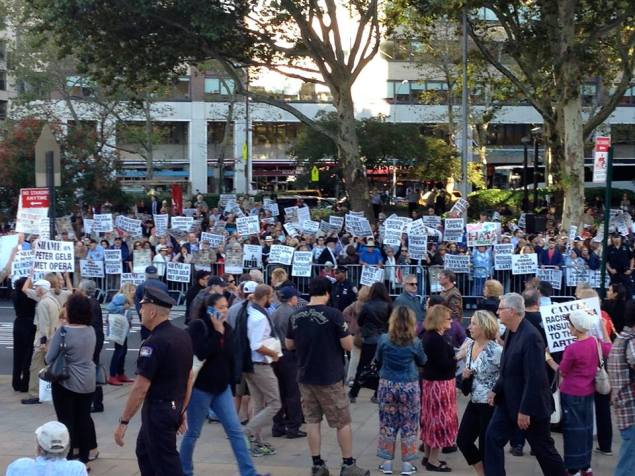
To be a liberal anywhere is difficult, but there are times I think in that in New York it’s close to impossible. The essence of liberalism is tolerance amounting to respect for the beliefs of others, but the problem is that sometimes those “others” have beliefs that amount to sheer stupidity.
It was with a sense of immense ambivalence that I walked into Lincoln Center last night for the opening of the Metropolitan Opera’s season: on the steps of the Plaza and across Columbus Avenue in Dante Park were ranged what I estimated at about 400 protesters against—not Le Nozze di Figaro, the opera featured that night—but a presentation a month in the future, The Death of Klinghoffer.
This 1991 opera with music by John Adams and text by Alice Goodman is new to the Met. It is a rumination of sorts on the hijacking of the passenger liner Achille Lauro by the Palestine Liberation Front in 1985, climaxing in the (offstage) murder of wheelchair-bound Jewish-American passenger Leon Klinghoffer.
From the beginning, this piece has been dogged by controversy: Klinghoffer’s daughters, Lisa and Ilsa Klinghoffer, anonymously attended the American premiere of the work and later denounced it as “a production that appears to us to be anti-Semitic.” Some planned productions of the opera have been canceled due to protests from Jewish groups, and the purpose of the protest on Monday seemed to be to pressure the Met to follow suit.
Because I am a liberal, I am in favor of protest. I have to be, because the essence of liberalism is the embrace of change, and change is achieved at least in part through protest. For instance, as an HIV+ gay man, I have benefited vastly from the reforms in healthcare instigated by the subversive and sometimes illegal protest actions taken by groups like ACT UP.
But a philosophical espousal of the principle of protest doesn’t entail an endorsement of the content of a particular demonstration. I applaud the Klinghoffer protesters for voicing their opinions, but that doesn’t stop me from saying that I find those opinions ill-informed, inept and downright dangerous.
The protest is ill-informed primarily because it is based on hearsay rather than the actual experience of seeing and hearing Klinghoffer. For instance, Abraham H. Foxman, the National Director of the Anti-Defamation League, successfully spearheaded the effort to shut down the Met’s HD telecast of the opera despite admitting that he has never seen the piece performed.
But simply reading the libretto (as Mr. Foxman admits was the basis of the ADL’s decision to take this action) yields at best a narrow view of an opera. The real, deeper meaning is in the music, a form uniquely capable of expressing complexity of emotion. And the music of Klinghoffer is in no way anti-Semitic.
Contacted earlier today by email, composer Nico Muhly pointed out that “… the terrorists’ music is in general wildly terrifying and brutal: twisted lines, synthesized landscapes out of a nightmare … The last 12 minutes of this opera—from when the Captain tells Marilyn Klinghoffer that her husband has been shot and pushed overboard through her furious song that gives way to exhaustion—is unspeakably beautiful … It’s a gentle consolidation.”
Attempting to prevent Klinghoffer from being performed is counterproductive. Labeling a book “Banned in Boston” used to guarantee a best seller. More recently, a famous diva’s attempt to suppress something as innocuous as an obscure aerial photograph roused such backlash that the process of censorship inflaming interest is now dubbed “the Streisand Effect.”
Finally, these protests, however sincerely motivated as they may be, have a profoundly chilling effect on artistic expression. If so staid (and well-funded) an institution as the Metropolitan Opera can be pressured into censoring itself based on whispered charges of “anti-Semitism,” then every artistic institution and every artist in the United States is in imminent danger.
The function of art, or a least of high art, is not to reinforce existing prejudices. A work of art is not supposed to agree with us any more than we are required to agree with it. On the contrary, art is supposed to inspire a dialogue, even an argument with the spectator and with society as a whole. If that dialogue is quashed by a few hundred, or even thousands of protesters, then art cannot exist.
If belief in protest is basic to liberal thought, so is belief in artistic freedom. These two ideals necessarily conflict, sometimes as violently as did the terrorists and passengers aboard the Achille Lauro. But, as Mr. Adams and Ms. Goodman suggest in The Death of Klinghoffer, the resolution of a conflict is impossible if one side refuses to respect the other’s right to exist.
James Jorden is the Observer’s opera critic.

